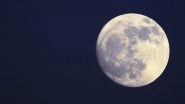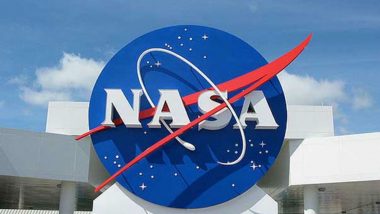Washington, Sep 3: In preparation of the future Artemis missions to the Moon, NASA has completed a full-scale booster test for the agency's Space Launch System (SLS) rocket.
NASA and Northrop Grumman, the SLS booster lead contractor, will use data from the test, successfully conducted on Wednesday, to evaluate the motor's performance using potential new materials and processes that can be incorporated into future boosters, the US space agency said.
"Landing the first woman and the next man on the Moon is just the beginning of NASA's Artemis Programme," NASA Administrator Jim Bridenstine, said in a statement. Chandrayaan 3 Update: India’s Third Lunar Mission to Have Lander, Rover and Propulsion System, but No Orbiter, Says Dr Jitendra Singh.
"The SLS flight support booster firing is a crucial part of sustaining missions to the Moon. NASA's goal is to take what we learn living and working on the Moon and use it to send humans on the first missions to Mars."
The SLS boosters are the largest, most powerful boosters ever built for flight, according to NASA.
The two boosters on the rocket provide more than 75 per cent of the thrust needed to launch NASA's future deep space missions through Artemis lunar programme.
NASA and Northrop Grumman have previously completed three development motor tests and two qualification motor tests.
"NASA is simultaneously making progress on assembling and manufacturing the solid rocket boosters for the first three Artemis missions and looking ahead toward missions beyond the initial Moon landing," said John Honeycutt, the SLS Program Manager at NASA's Marshall Space Flight Center in Huntsville, Alabama.
"Today marks the first flight support booster test to confirm the rocket motor's performance using potential new materials for Artemis IV and beyond."
NASA is working to land the first woman and next man on the Moon by 2024.
The SLS rocket, Orion spacecraft, Gateway, and human landing system are part of NASA's backbone for deep space exploration.
SLS is the only rocket that can send Orion, astronauts and supplies to the Moon in a single mission, NASA said.
(The above story first appeared on LatestLY on Sep 03, 2020 02:25 PM IST. For more news and updates on politics, world, sports, entertainment and lifestyle, log on to our website latestly.com).













 Quickly
Quickly


